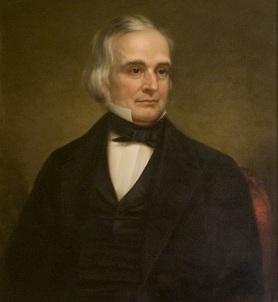William Sprague III facts for kids
Quick facts for kids
William Sprague III
|
|
|---|---|
 |
|
| United States Senator from Rhode Island |
|
| In office February 18, 1842 – January 17, 1844 |
|
| Preceded by | Nathan F. Dixon |
| Succeeded by | John B. Francis |
| 14th Governor of Rhode Island | |
| In office May 2, 1838 – May 2, 1839 |
|
| Lieutenant | Joseph Childs |
| Preceded by | John B. Francis |
| Succeeded by | Samuel Ward King |
| Member of the U.S. House of Representatives from Rhode Island's At-large district |
|
| In office March 4, 1835 – March 3, 1837 |
|
| Preceded by | Tristam Burges |
| Succeeded by | Robert B. Cranston |
| Speaker of the Rhode Island House of Representatives | |
| In office 1832–1835 |
|
| Preceded by | Joseph L. Tillinghast |
| Succeeded by | Henry Y. Cranston |
| Personal details | |
| Born | November 3, 1799 Cranston, Rhode Island |
| Died | October 19, 1856 (aged 56) Providence, Rhode Island |
| Political party | Whig |
William Sprague, also known as William III, was an important leader in government and business from Rhode Island. He was born on November 3, 1799, and passed away on October 19, 1856. During his life, he served as the 14th Governor, a U.S. Representative (meaning he helped make laws for the country), and a U.S. Senator. He was also the uncle of another famous politician named William Sprague IV, who also became a Governor and Senator for Rhode Island.
Contents
William Sprague's Life and Work
Early Life and Education
William Sprague was born in Cranston, Rhode Island, at a place called the Gov. William Sprague Mansion. His parents were William Sprague and Anna Potter. When he was young, he studied classic subjects like history and literature. He also started working in trade and business, which helped him learn a lot about how money and companies work.
Starting in Politics
William Sprague became a member of the Rhode Island House of Representatives. This is a group of people who make laws for the state. He was chosen to be the speaker of this group from 1832 to 1835. As speaker, he led different political groups, including the Anti-Masonic and Democratic Parties, to work together.
Serving the Country
In 1835, William Sprague was elected to the United States Congress as a member of the Whig Party. He represented the entire state of Rhode Island. He served in Congress from March 4, 1835, to March 3, 1837. After this, he decided not to run for re-election.
In 1838, he was elected Governor of Rhode Island. This was a very important job, as he was the leader of the whole state. Later, in 1842, he became a U.S. Senator. He took the place of Nathan F. Dixon, who had passed away. He served as a Senator until January 17, 1844, when he decided to leave the position. While in the Senate, he led a special group called the United States Senate Committee on Enrolled Bills, which checked new laws. In 1848, he also helped choose the U.S. President as part of the Whig Party.
Family Business and Legacy
William Sprague's family was very successful in business, especially in making cotton and paint. After a difficult family event in 1843, William took over running the family businesses. He also became the president of a railroad company called Hartford, Providence, and Fishkill Railroad, and he led two banks.
The Sprague family has many relatives who still live in places like Utica, New York. William Sprague passed away in Providence, Rhode Island. He was buried in Swan Point Cemetery in Providence.
 | Chris Smalls |
 | Fred Hampton |
 | Ralph Abernathy |

